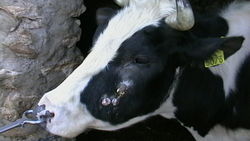Mandibular Osteomyelitis
Also known as: Lumpy jaw — Actinomycosis
Introduction
Lumpy jaw is a chronic infectious condition which affects cattle. It is caused by the anaerobic filamentous bacteria Actinomyces bovis.
Actinomyces is a normal commensal of the oral cavity, upper respiratory tract and digestive tract of cattle, it gains entry to underlying soft tissues when the mucosa is damaged by trauma or eruption of teeth. It causes an inflammatory reaction, the connective tissue proliferates and is followed by infiltration of leukocytes which results in the formation of a walled off granuloma. The granuloma invades the bones of the head, in particular the mandible, and continues to grow in size. Lesions are characterised by gross swelling, abscesses and draining fistulae overlying granulation of the mandible and maxilla. In some cases the oesophagus and oesophageal groove may become involved but the lymph nodes are not affected.
Signalment
The condition affects cattle 2-5 yrs old. It is found worldwide but is most prevalent in Western and mid-western states of the USA.
Diagnosis
The condition is easily diagnosed on clinical signs and can be confirmed by crushing and staining the yellow granules expressed with the pus from skin lesions to reveal gram-positive filamentous rods.
Clinical signs
- Facial distortment
- Granuloma formation overlying the mandible and maxilla
- Fistulae draining small amounts of thick pus with yellow granules
- Difficulties with mastication
- Loose teeth
- Dyspnoea
Pathology
Osteomyelitis of the bones of the head with surrounding granulomatous tissue and fistulae draining pus containing small yellow granules.
Treatment
Treatment is difficult due to the nature of the lesions and poor antibiotic penetration to the site of infection. In less severe cases where infection of the bones is not advanced treatment with penicillin or tetracyclines is recommended. Previously it has been suggested that systemic treatment with potassium iodide is successful but this is no longer recommended due to food safety concerns.
Prognosis
Treatment is rarely successful in advanced cases and recurrence of lesions is common; slaughter is advised.
Literature Search
Use these links to find recent scientific publications via CAB Abstracts (log in required unless accessing from a subscribing organisation).
Mandibular Osteomyelitis publications
References
- Andrews, A.H, Blowey, R.W, Boyd, H and Eddy, R.G. (2004) Bovine Medicine (Second edition), Blackwell Publishing
- Merck & Co (2008) The Merck Veterinary Manual (Eighth Edition) Merial
| This article has been peer reviewed but is awaiting expert review. If you would like to help with this, please see more information about expert reviewing. |

